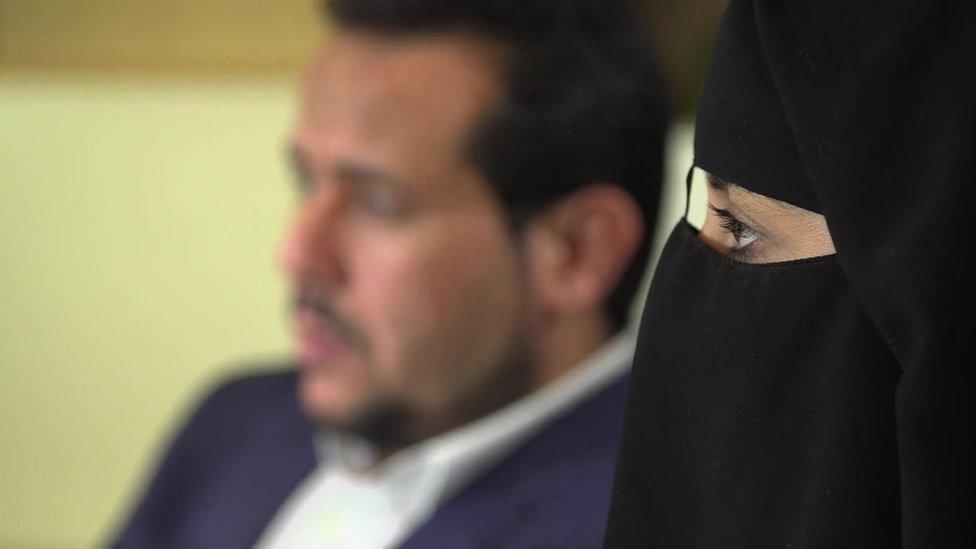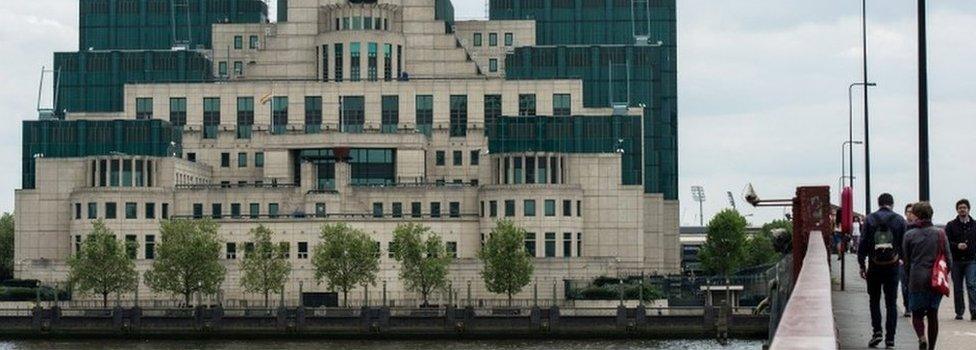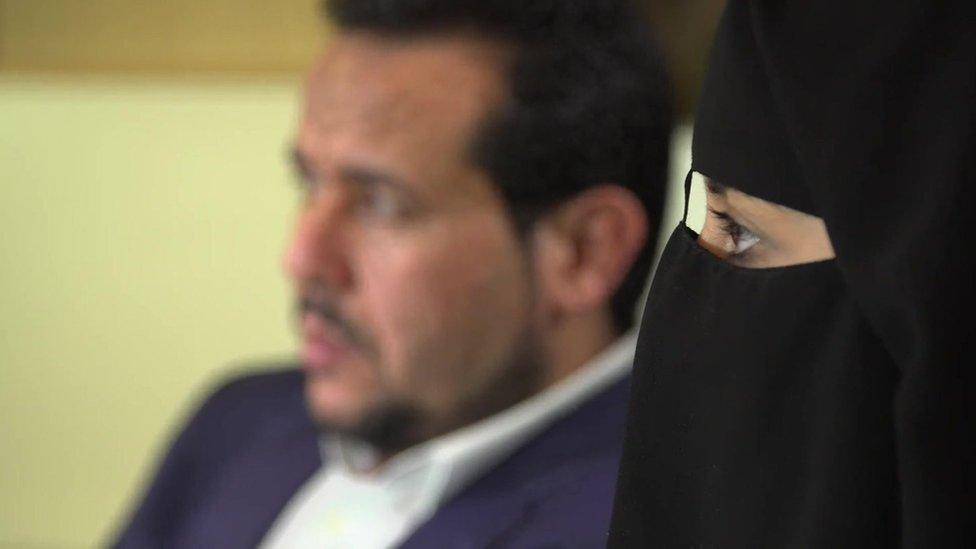'Tortured' rendition couple angry over failure to charge MI6
- Published
Abdel Hakim Belhaj and his wife, Fatima Boudchar, were sent to Libya - he says he was tortured
A man who was secretly detained and sent to Libya with his pregnant wife in 2004 has spoken of his disappointment that no-one will be prosecuted.
Ex-Libyan dissident Abdel Hakim Belhaj says the UK's MI6 helped to arrange the couple's rendition - saying they were covertly taken from Thailand to Libya.
Sami al-Saadi and his family were also sent to Libya in 2004, where he was allegedly tortured.
Prosecutors said there was insufficient evidence to charge anyone from MI6.
Mr Belhaj told the BBC he was "very disappointed that individuals responsible" would not be prosecuted, adding: "If there is political interference with the courts, then it undermines British justice."
Rendition involves sending a person from one country to another for imprisonment and interrogation, and in some cases torture.
'Injected'
Mr Belhaj, who commanded an armed opposition group against Libyan dictator Colonel Muammar Gaddafi, and his wife, Fatima Boudchar, had been trying to seek asylum in the UK when they were taken from Bangkok to Tripoli in 2004.
Their lawyers claimed it was a joint operation between the US intelligence service the CIA and its UK counterparts from MI6 to help Col Gaddafi round up his enemies.
Mr Belhaj alleges he was tortured by his jailers and questioned by British intelligence officers during a six-year detention.

Fatima Boudchar says she feared she would die during her detention
Mrs Boudchar, who was pregnant at the time of her detention and transfer to Libya, spent four months in a Libyan prison.
Speaking in her first television interview, she told the BBC: "My hands and legs were tied and my eyes were covered. They injected me with something. I didn't know where I was going.
"I was six months' pregnant. I was so scared that I was going to die."
Separately, Mr al-Saadi and his family were taken from Hong Kong and sent to Libya, where he was allegedly tortured. Memos indicated that MI6 was involved in his transfer.
Warming relations
The Metropolitan Police and the Crown Prosecution Service opened an investigation in January 2012 after documents found following the fall of Col Gaddafi suggested that MI6 had been involved in the rendition.
The documents included letters signed by "Mark". It has been claimed that this is Sir Mark Allen, then MI6 director of counter terrorism.
In a letter to Moussa Koussa, head of Col Gaddafi's intelligence agency, dated March 2004, "Mark" thanked him for helping to arrange a meeting in the desert between then Prime Minister Tony Blair and Col Gaddafi, as part of a warming of relations between the UK and Libya.
"Mark" wrote: "More importantly, I congratulate you on the safe arrival of Abu Abd Allah Sadiq (Mr Belhaj)… This was the least we could do for you and for Libya to demonstrate the remarkable relationship we have built over the years."

Analysis

Even though there will be no prosecution of MI6 officers, the Libyan case still raises many questions.
For the first time, the CPS statement confirms that MI6 was in "communication" with individuals from foreign countries involved in the rendition, and seems to confirm the broad outline of the allegations (even though it finds insufficient evidence to charge).
In one of the most intriguing lines, it also says that the MI6 officer involved sought political authority for "some" of his actions, but not in a formal way. This goes to one of the mysteries surrounding the operation - who authorised it?
Sensitive MI6 operations are supposed to be authorised by politicians - normally the foreign secretary. Jack Straw was foreign secretary at the time and has denied any role in rendition.
And today's statement seems to support the idea that MI6 was operating at the time with only partial political cover.
There was no written record and nor did the officer, we learn, get authority for all his communications and conduct from whomever he talked to. That will raise questions about whether MI6 was operating under sufficiently strong oversight at the time.

The Crown Prosecution Service (CPS) said an unnamed public official had been investigated for aiding, abetting, counselling or procuring any offence of torture, and misconduct in public office.
It was found the person did not have any connection with the initial physical detention of either man or their families, the CPS said.
Sue Hemming, of the CPS, said: "Following a thorough investigation, the CPS has decided that there is insufficient evidence to charge the suspect with any criminal offence.
"We made our decision based upon all the available admissible evidence and after weighing up all of the information we have been provided with."
'Without fear or favour'
Mr Belhaj's lawyer Cori Crider told the BBC: "This suggests to me the security services are functionally above the law. If you're not going to charge in this case, then when are you going to charge?"
Lib Dem MP Alistair Carmichael has called for the government to make a statement to MPs following the CPS's decision.
The government's Intelligence and Security Committee said later it would examine the families' case as part of its ongoing inquiry into detainee treatment and rendition.
Scotland Yard said a small team of detectives had spent more than two years conducting a "thorough and penetrating investigation without fear or favour", and it was for the CPS to decide whether to prosecute.
Both Mr al-Saadi and Mr Belhaj pursued civil claims against the British government and named individuals. Mr al-Saadi settled out of court but Mr Belhaj's case is continuing.
- Published9 June 2016

- Published9 November 2015